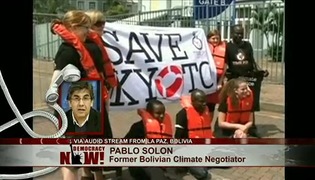
Guests
- Jason DrewSouth African entrepreneur and author of The Protein Crunch: Civilisation on the Brink.
- Patrick BondSouth African climate activist and professor. He is the director of the Centre for Civil Society at the University of KwaZulu-Natal in Durban. He is author of two new books, Durban’s Climate Gamble: Playing the Carbon Markets, Betting the Earth and Politics of Climate Justice: Paralysis Above, Movement Below.
- Pablo SolonBolivia’s former ambassador to the United Nations. He also served as Bolivia’s chief negotiator on climate change.
On Sunday, Democracy Now! attended the corporate-sponsored World Climate Summit in Durban that advocates a market approach to solving the climate crisis. One attendee, South African entrepreneur Jason Drew, called for the United Nations to step aside and let businesses and markets fix the problems caused by global warming. When asked why business would be interested in saving the people of the Maldives from catastrophic climate change, Drew responded, “Customers live there. It’s a business world. It’s capitalism. We need people to buy our goods… They all buy iPads, Coca-Cola, all the products we know. If they don’t exist anymore, the market’s gone.” [includes rush transcript]
Transcript
AMY GOODMAN: We’re broadcasting live throughout this week, ending tomorrow, here in Durban, South Africa, where the COP 17 is having its meeting, the Conference of Parties, the U.N. Climate Change Conference, the only broadcast from the United States doing an hour a day on television and radio on over a thousand stations around the country and around the world. I’m Amy Goodman.
On Sunday, Democracy Now! producer Mike Burke attended the corporate-sponsored World Climate Summit here in Durban that advocates a market approach to solving the climate crisis. One of the people who attended was the South African entrepreneur Jason Drew.
JASON DREW: We’re here talking about COP 17. ”COP 17,” that means there’s been 17 previous conferences. Most shots I’ve ever had at a business is twice, and that’s lucky. Most times you get one go. COP 17 is a cop-out, because it’s taken us 17 goes to try and fix the environmental problems from a political stance. What we can do is fix it from a business stance. There are so many businesses in this world busy repairing our future, which, from where I stand today, is broken. We need to repair the future. And it’s businesses and individuals that will drive that change, not governments.
MIKE BURKE: I’m curious how you would describe this or, you know, make this argument to someone, say, from the Maldives or one of the small island nations. What—why would any corporation be that interested, say, in saving the Maldives? What would be in their interest to do that?
JASON DREW: Consumers live there. Customers live there. It’s a business world. It’s capitalism. We need people to buy our goods. If people don’t buy my goods, I haven’t got a business. So, therefore, we need to save those things. Two, three, four hundred thousand people in the Maldives, they all buy iPads, Coca-Cola, all the products we know. If they don’t exist anymore, the market’s gone. This is about market economics.
AMY GOODMAN: South African entrepreneur Jason Drew. Patrick Bond, your response?
PATRICK BOND: Well, you know, Amy, I don’t know why anyone in their right mind would trust the financial markets these days to do anything even to save their own markets. I mean, the bailouts are notorious, and the crises get worse and worse. So, carbon markets, especially, they’re crashing now. As we speak, Union Bank of Switzerland expects them to go down to three euros a ton, from their peak at about 33. So, look, unfortunately, the people here do believe in carbon markets, and they’re trying to make the Green Climate Fund based upon revenues from these markets. So, sadly, this is the sort of mentality that does prevail in these U.N. negotiations and businesses around them.













Media Options